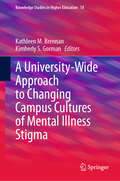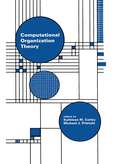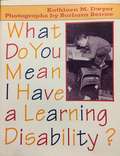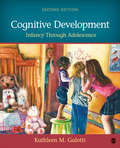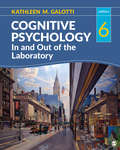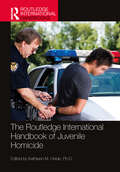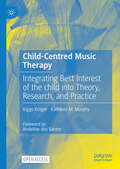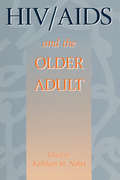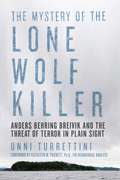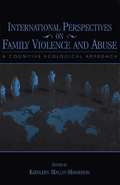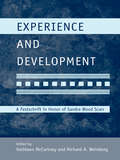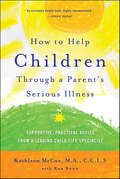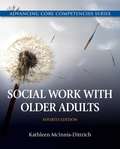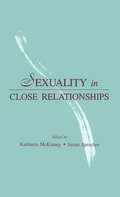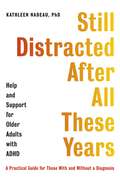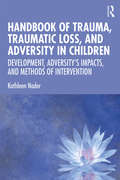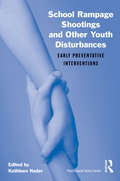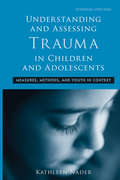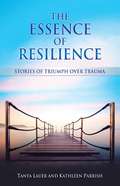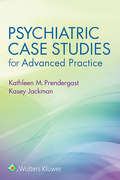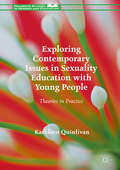- Table View
- List View
A University-Wide Approach to Changing Campus Cultures of Mental Illness Stigma (Knowledge Studies in Higher Education #18)
by Kathleen M. Brennan Kimberly S. GormanThis interdisciplinary volume addresses the progress made regarding mental illness stigma in the realm of higher education while acknowledging how stigma has transformed to present more subtle challenges in this context and how it may be addressed to promote positive campus outcomes. Written by researchers and practitioners who representdifferent fields within higher education, it highlights the existence of stigma by focusing on its presence in the curriculum, in policies, and in processes within the university. It discusses both the presence and impact of stigma in undergraduate and graduate studies, athletics, and faculty and staff. The book emphasizes a collaborative approach to involve stakeholder groups across campus by providing practical, preemptive solutions to reduce stigma. This volume can be used as a practical guide for any institution of higher educationwishing to address mental illness stigma on their campus in a strategic, systemic manner. Additionally,it will be helpful for individuals working in higher education as a guide for reflecting on and changing their individual practice.This book greatly appeals to those who are interested in addressing mental illness stigma systemically.
Computational Organization Theory
by Kathleen M. Carley Michael J. PrietulaThis volume represents an advance in our understanding of how to represent and reason about organizational phenomena. Although organizational theorists have long grappled with the complexities of adaptive agents, ecological systems, and non-linear relations among the basic elements of organizational design, they have not, until recently, had the tools to grapple with these complex relationships. Recent advances in logic, symbolic programming, network analysis, and computer technology have made possible a series of tools that can be used to understand the complexities of organizational behavior. New computational techniques make it possible to develop and test more realistic models of organizational behavior. This volume offers examples of this new breed of models, and provides insight into how these advances and techniques can be used to extend our theoretical understanding of organizations. Authored by leading researchers in the area of computational organization theory, the various chapters demonstrate the value of computational analysis for organizational theory and advance our understanding of the relationship between organizational design and performance. This book contains both theoretical and methodological contributions that enable organizational theorists to use computational and mathematical techniques to systematically address the complex relationships that underlie organizational life. It also presents new -- or sometimes, renewed -- approaches on how to conduct organizational research from multiple formal perspectives including: simulation, numerical analysis, symbolic logic, mathematical modeling, and graph theory.
What Do You Mean I Have a Learning Disability?
by Kathleen M. DwyerTen-year-old Jimmy just accepts the fact that other kids can do things better than he can. It's always been that way--but now Jimmy is starting to think there must be a reason. One day he whispers to his cat, "I'm so stupid. I know I am." This true story has a happy ending. One of Jimmy's teachers encouraged his parents to have Jimmy tested, and it turned out that he had a learning disability. Hard work and perseverance, and the support of his family, helped Jimmy overcome his disability. For children who are learning disabled, and for their families and friends, this inspiring book offers encouragement and support in a shared effort.
Cognitive Development: Infancy Through Adolescence
by Kathleen M. GalottiWritten in Kathleen M. Galotti′s signature engaging style, this text is a dynamic examination of cognitive development from infancy through adolescence. Updated and reorganized throughout, the Second Edition weaves together a variety of theoretical perspectives while considering issues of research methodology. Introductory chapters cover theoretical and developmental frameworks and are followed by chronologically arranged chapters, giving undergraduate and graduate students an understanding of the "whole" child in an accessible, intuitive framework.
Cognitive Development: Infancy Through Adolescence
by Kathleen M. GalottiWritten in Kathleen M. Galotti′s signature engaging style, this text is a dynamic examination of cognitive development from infancy through adolescence. Updated and reorganized throughout, the Second Edition weaves together a variety of theoretical perspectives while considering issues of research methodology. Introductory chapters cover theoretical and developmental frameworks and are followed by chronologically arranged chapters, giving undergraduate and graduate students an understanding of the "whole" child in an accessible, intuitive framework.
Cognitive Psychology In and Out of the Laboratory
by Kathleen M. GalottiCognitive Psychology In and Out of the Laboratory presents balanced, up-to-date coverage of cognitive psychology and shows readers that research conducted in the lab truly does impact the real world. Using her signature, accessible writing style, author Kathleen M. Galotti masterfully connects cognitive psychology to students′ everyday lives through current, relevant examples. The Sixth Edition has been updated to reflect the rapidly changing field of cognitive psychology with new references, streamlined content that gives more attention to key topics like memory, and material on advances in research that enhance our understanding of how people acquire and use information. Interactive eBook also available—bundle it with the new edition! Your students save when you bundle the new edition with the interactive eBook version. Order using bundle ISBN 978-1-5063-9877-8. /p>
Cognitive Psychology In and Out of the Laboratory
by Kathleen M. GalottiCognitive Psychology In and Out of the Laboratory presents balanced, up-to-date coverage of cognitive psychology and shows readers that research conducted in the lab truly does impact the real world. Using her signature, accessible writing style, author Kathleen M. Galotti masterfully connects cognitive psychology to students′ everyday lives through current, relevant examples. The Sixth Edition has been updated to reflect the rapidly changing field of cognitive psychology with new references, streamlined content that gives more attention to key topics like memory, and material on advances in research that enhance our understanding of how people acquire and use information. Interactive eBook also available—bundle it with the new edition! Your students save when you bundle the new edition with the interactive eBook version. Order using bundle ISBN 978-1-5063-9877-8. /p>
Making Decisions That Matter: How People Face Important Life Choices
by Kathleen M. GalottiResearchers studying decision making have traditionally studied the phenomenon in the laboratory, with hypothetical decisions that may or may not involve the decision maker's values, passions, or areas of expertise. The assumption is that the findings of these well-controlled laboratory studies will shed light on the important decisions people make in their everyday lives. This book examines that assumption. The volume begins by covering four basic phases of decision making: setting or clarifying goals, gathering information, structuring the decision, and making a final choice. Comprehensive reviews of existing literature on each of these topics is provided. Next, the author examines differences in decision making as a function of several factors not typically discussed in the literature: the type of decision being made (e.g., legal, medical, moral) and the existence of individual differences in the decision maker (developmental differences, individual differences in style or temperament, differences as a function of expertise). The author then examines the topic of group decision making, contrasting it with individual decision making. The volume concludes with some observations and suggestions for improving peoples' everyday decision making. This book is intended for use as a core textbook or supplement for courses in psychology, education, or allied disciplines. It will also be an invaluable resource for people who work with people making decisions in various applied settings, such as schools, universities, and health care centers.
The Routledge International Handbook of Juvenile Homicide (Routledge International Handbooks)
by Kathleen M. HeideThe Routledge International Handbook of Juvenile Homicide is the definitive work on juvenile homicide. This volume provides an up-to-date, comprehensive, and in-depth exploration of what is known about juveniles involved in murder. Taking an interdisciplinary approach to juvenile homicide, this handbook brings together the leading experts in social sciences, mental health, and law from many countries. The volume covers the phenomenon of juvenile homicide from beginning to end, by addressing the questions “why do kids kill?” all the way to “how does society stop them from killing?”. The tough issues involved in sentencing youths who take the lives of others, often deliberately and in horrific ways, are confronted through chapters addressing the legal issues, child development factors, risk assessment, public attitudes, and ethical concerns. The volume brings together research specifically conducted for this volume, in addition to summaries and discussions of clinical and empirical findings. Each chapter ends with key takeaway points. Contributors include psychologists, psychiatrists, criminologists, sociologists, lawyers, economists, biologists, epidemiologists, and public health and public policy experts. Uniquely, they examine murder by juveniles across the globe. The volume includes research pertaining to the causes, correlates, and theoretical explanations of juvenile homicide offending. Moving beyond discussions of juvenile homicide offenders (JHOs) as a homogenous group, the volume includes research on specific types of JHOs and research investigating age and gender differences among JHOs. In addition, it draws attention to the empirical factors associated with juvenile homicide offending, effective treatment of JHOs, recidivism, and prevention of violent behavior. The volume also makes recommendations for policy and practice, including how to shift government policy from punishing lawbreakers to saving lives. This volume is essential reading for scholars and students researching youth violence/juvenile homicide across a variety of disciplines including criminology, criminal justice, law, psychology, psychiatry, sociology, social work, public health, and education. It is also an invaluable reference for mental health professionals, practitioners in the juvenile and criminal justice systems, policymakers, and government leaders.
Child-Centred Music Therapy: Integrating Best Interest of the child into Theory, Research, and Practice
by Kathleen M. Murphy Viggo KrügerThis open access book draws on recent developments in children&’s rights, particularly concerning the child&’s right to participation, provision and protection. Since 1989, the UNCRC has become a catalogue of rights that expresses legal norms used by all countries in the world. The UNCRC can be considered a toolkit that expresses a normative order, that is, a human rights standard for how to legitimately protect children, and to facilitate processes of participation. For many children and adolescents&’ music is a significant source for gaining health and social/cultural participation. Music then, has the potential for realizing values inherent in the UNCRC. The main aim of this book is to utilize The United Nations Conventions on the Rights (UNCRC) as a tool to give an overview of relevant themes, and to critically explore what implications the convention has for the profession of music therapy, and more specifically, music therapy for children and adolescents.
HIV & AIDS And The Older Adult
by Kathleen M. NokesFirst published in 1996. The incidence of HIV/AIDS in society has reached epidemic levels. People of all ages are contracting the disease, and with the advances in medication and treatment, those with the disease are living longer. This book discusses the unique issues facing older adults with HIV/AIDS and addresses living with the disease.
The Mystery of the Lone Wolf Killer: Anders Behring Breivik and the Threat of Terror in Plain Sight
by Kathleen M. Puckett Unni Turrettini<P>For the first time, the life and mind of Anders Behring Breivik, the most unexpected of mass murderers, is examined and set in the context of wider criminal psychology. <P>July 22, 2011 was the darkest day in Norway's history since Nazi Germany's invasion. It was one hundred eighty-nine minutes of terror--from the moment the bomb exploded outside a government building until Anders Behring Breivik was apprehended by the police at Utoya Island. Breivik murdered seventy-seven people, most of them teenagers and young adults, and wounded hundreds more. The massacre left the world in shock. <P>Breivik is a new type of mass murderer, and he is not alone. Indeed, he is the archetypal "lone wolf killer," often overlooked until the moment they commit their crime. He has inspired others like him, just as Breivik was inspired by Timothy McVeigh and Theodore Kaczynski. No other killer has murdered more people single-handedly in one day. Adam Lanza studied Breivik's now infamous manifesto prior to his own unthinkable crime. Breivik was Lanza's role model, as he will no doubt be for others in the future who are frustrated with their societies, and most of all, their lives. <P>Breivik is also unique as he is the only "lone wolf" killer in recent history to still be alive and in captivity. With unparalleled research and a unique international perspective, The Mystery of the Lone Wolf Killer examines the massacre itself and why this lone-killer phenomenon is increasing worldwide.
God Forbid: Religion and Sex in American Public Life
by Kathleen M. SandsSince the 1980s, religion has been most visible in American public life when issues of sexuality and reproduction are at stake. Paradoxically, however, the voices that speak most loudly in the name of religion are often unschooled in religious history, world religions, theology, or ethics. As a result, religion in America is misrepresented as anxiously and obsessively concerned with sex, and as uniformly supporting the conservative agenda of "family values." This volume corrects that distortion in American public discourse. Its thirteen previously unpublished articles introduce scholarly perspectives on issues including the family, gay rights, abortion, welfare policy, prostitution, and assisted reproduction. They richly display the complexities and conflicts that exist not only between but within America's various religious traditions--for example, the pro-choice strain within Christian history, the support of many religious denominations for gay rights, and the criticism of patriarchal family structures within religious communities past and present. In these essays, contributors put forth views of sexual ethics that are just and compassionate, respectful of cultural pluralism, and attentive to democratic processes. Thoroughly researched, lucidly written, and carefully argued, this anthology will debunk the claims of the Religious Right to be the only "religious" word on sexuality in America.
International Perspectives on Family Violence and Abuse: A Cognitive Ecological Approach
by Kathleen Malley-MorrisonIn this book, in which definitions and examples of abuse from men and women from every continent and a very diverse set of backgrounds are considered. The volume provides information on the extent to which family violence is a recognized problem in each country, research findings available on different forms of family violence, and information on governmental responses to family violence. Finally, the value of an international human rights approach to abuse and violence in families is considered. The book presents an unparalleled international coverage, addressing all forms of family violence in Australia and at least two countries from every other continent. Each chapter begins by describing the cultural context in which family violence and abuse take place. These sections emphasize the role of women and children in the country. Providing a multitude of voices, each chapter includes fascinating and often dramatic definitions and examples of abuse from ordinary citizens of the country. The concluding chapter elaborates on the appropriateness of a human rights approach in addressing family violence cross-nationally and cross-culturally; and provides an excellent integration of much of the material from the previous chapters. The book is intended for advanced undergraduates and graduate students in psychology and sociology, as well as pre-professionals and professionals in medicine, law, and social services. It has strong relevance and value to individuals training in counseling (counselor education) and clinical psychology. Because of its readable style and extensive use of quotations from citizens of the countries studied for the book, it may also appeal to a much broader audience, including a lay audience.
Experience and Development: A Festschrift in Honor of Sandra Wood Scarr (Modern Pioneers in Psychological Science: An APS-Psychology Press Series)
by Kathleen McCartney Richard A. WeinbergThe scope of these chapters reflects the strong influence that Sandra Wood Scarr’s scholarship—her empirical research and theoretical contributions—has had on what we know about experience and development via the lens of the psychological sciences, especially the fields of developmental psychology, behavior genetics, early education and child care.
How to Help Children Through a Parent's Serious Illness: Supportive, Practical Advice from a Leading Child Life Specialist
by Kathleen McCue Ron BonnHow to Help Children Through a Parent's Serious Illness has become the standard work on an important subject. A classic for over fifteen years, it continues to be a go-to book for supportive, practical advice, based on the lifetime experience and clinical practice of one of America 's leading child life practitioners.Fully revised and updated, this new edition also explores the major issues and developments from the last decade that affect children today, including the dangers and opportunities of the Internet, a deeper understanding of how hereditary diseases affect children, the impact of the nation's explosive growth in single-parent families, and new insights into how family trauma and a parent's mental illness may affect children.
Social Work with Older Adults: A Biopsychosocial Approach to Assessment and Intervention (Fourth Edition)
by Kathleen McInnis-DittrichThe fourth edition of Social Work with Older Adults provides a comprehensive treatment of a strengths-based approach to the major areas of social work with older adults. The text examines the basics of biopsychosocial functioning and the design of interventions to treat a wide variety of challenges facing older adults. This updated edition includes content on abuse and neglect of older adults, drug and alcohol abuse and the social worker’s role in dying, bereavement, and advance directives.
Sexuality in Close Relationships
by Kathleen Mckinney Susan SprecherThis is one of the first volumes to examine the interface between research undertaken in sexuality and that in close relationships from a social psychological perspective. Experts from several different disciplines offer chapters that contain theory, extant literature, and their own original research on such topics as jealousy, extradyadic sexuality, communication, love, and sexual coercion. Aimed at a fairly wide audience, this book will be of interest to students, faculty, and other professionals in social psychology, sociology, communication, and family and women's studies. It is also a valuable source of information for teachers, researchers, and clinicians working in the areas of human sexuality and/or close relationships.
Still Distracted After All These Years: Help and Support for Older Adults with ADHD
by Kathleen NadeauThe world's foremost expert shares advice on later-in-life ADHD, tackling everything from finances, parenting, planning for retirement, social life and work, in this practical and helpful guide for those with and without a diagnosis.Do you...· Forget to pay bills?· Live in a disorganised environment?· Struggle with mental health?· Procrastinate on projects, even ones that initially excite you?· Have high levels of conflict with those close to you?· Have a child diagnosed with ADHD and/or a family history of learning disorders?If some of these patterns sound familiar, you might understandably fear the onset of dementia, but you may have undiagnosed attention deficit hyperactivity disorder (ADHD). ADHD in adults is one of the most common disorders. Living with ADHD in our later years is hugely influenced by co-occurring issues, such as anxiety, depression or low self-esteem. In addition, the presence of learning disorders, heightened levels of stress, the presence or lack of support from others, and the number of people we are responsible for, can all complicate and intensify the effects of ADHD.The good news is that you've come to the right place to learn more about how to lead a calmer, happier, more productive life. Dedicated to the health and wellbeing of today's older adults with ADHD, Still Distracted After All These Years offers strategies to build a support system, gain better control over your daily life and create a more ADHD-friendly retirement.
Handbook of Trauma, Traumatic Loss, and Adversity in Children: Development, Adversity’s Impacts, and Methods of Intervention
by Kathleen NaderThe Handbook of Trauma, Traumatic Loss, and Adversity in Children is a developmentally oriented book rich with findings related to child development, the impact of trauma on development and functioning, and interventions directed at treating reactions to trauma. Aspects of attachment and parenting and the use of interrelationships toward therapeutic ends are included in each age-related section of the book, ranging from 0 to 18+. Consolidating research from a range of disciplines including neurobiology, psychopathology, and trauma studies, chapters offer guidance on the potentially cascading effects of trauma, and outline strategies for assisting parents and teachers as well as children. Readers will also find appendices with further resources for download on the book’s website. Grounded in interdisciplinary research, the Handbook of Trauma, Traumatic Loss, and Adversity in Children is an important resource for mental health researchers and professionals working with children, adolescents, and families during the ongoing process of healing from traumatic exposure.
School Rampage Shootings and Other Youth Disturbances: Early Preventative Interventions (Psychosocial Stress Series)
by Kathleen NaderTogether, School Rampage Shootings and Other Youth Disturbances and its accompanying CD provide a complete toolkit for using early preventative interventions with elementary-school age children. In ten thoughtful, clearly written chapters, both new and experienced practitioners will find a wealth of research- and evidence-based techniques that link personal child and childhood environmental conditions to a number of symptoms, disturbances, and disorders in youth or adulthood, including the expression of rampage violence. In the second part of this indispensable collection – the accompanying CD – practitioners will find worksheets and handouts that translate useful techniques into reality and are sure to make any practice come alive.
Understanding and Assessing Trauma in Children and Adolescents: Measures, Methods, and Youth in Context (Psychosocial Stress Series #Vol. 35)
by Kathleen NaderIn this volume, Kathleen Nader has compiled an articulate and comprehensive guide to the complex process of assessment in youth and adolescent trauma. There are many issues that are important to evaluating children and adolescents, and it is increasingly clear that reliance on just one type of assessment does not provide the most accurate results. From history to recent advances, this book covers a wide range of methods and measures for assessing trauma, including case examples to illustrate the integration of these different facets. Altogether, the broad scope and inclusive depth of this work make it an essential addition to the field of trauma assessment.
The Essence of Resilience: Stories of Triumph over Trauma
by Kathleen Parrish Tanya LauerWhen trauma enters the lives of the unsuspecting, it steals from their very soul. It not only robs them of peace and joy, it can take years and decades from their lives while they desperately try to fill the hole in their heart, pretending that their soul isn't leaking out of it. No one is ever prepared for trauma and no one is ever left unchanged by traumatic events. In the face of such adversity, what allows one person to find the gift in their wound and another to suffer endlessly? Enter Tanya Lauer and Kathleen Parrish, professional counselors at the internationally renowned residential treatment center, Cottonwood Tucson. With over 40 years combined experience helping people survive trauma and find the "gift in their wound," Lauer and Parrish offer The Essence of Resilience—an urgent and vital answer to this all-too-common marauder. Topical tools for healing include: Story, Relationships, Trust, Compassion, Gratitude, Animals and Pets, Nature, Humor, and Spirituality. Through stories, compassion and understanding, they guide readers straight to the heart of resilience—that place where we learn to heal and thrive.
Psychiatric Case Studies for Advanced Practice
by Kathleen PrendergastGet much-needed exposure to real-world clinical scenarios and psychiatric evaluations, with this invaluable guide to positive, effective psychiatric advance practice nursing care. For an expert guide to providing patient-centered, evidence-based psychiatric care, keep Psychiatric Case Studies for Advanced Practice by your side. Practical and easy-to-follow, these more than 50 case scenarios clearly display the complaints, diagnoses, and treatments of the most common psychiatric disorders, supporting the critical decision-making skills of nurses practicing in a broad range of settings. Psychiatric, family, emergency, and general practice nurse practitioners of all experience levels will find this an invaluable aid for creating an informed, holistic practice. Follow the real-life cases and expert analysis of psychiatric patients of a wide variety of ages, backgrounds, and conditions . . . Real-world child, adolescent, adult, and geriatric inpatient and outpatient psychiatric case studies that emphasize problem-based learning and an evidence-based practice Current diagnostic content from the Diagnostic and Statistical Manual of Mental Disorders, 5th Edition (DSM-5), that includes DSM-5’s newer diagnoses—gender dysphoria, binge eating disorder, and autism spectrum, plus current treatments for alcohol and opiate addiction Sample routine screening tools that offer convenient checklists and handouts to support patient treatment Content presented in a simple format—organized by age and indexed by diagnostic category for quick reference Each case presented in a standard format: chief complaint, history, mental status, diagnosis, differential diagnosis, treatment plan, and rationale for treatment prescribed—with questions at the end that guide you to create a diagnosis using the DSM-5 Cases addressing a wide range of disorders and supporting all experience levels in a variety of treatment settings—counseling centers, correctional facilities, homeless shelters, inpatient psychiatric units, and hospital consultation and liaison services Treatments and rationales that represent current, evidence-based research—treatment sections divided into psychopharmacology, diagnostic tests, referral, psychotherapy, and psychoeducatio Supplemental teaching tool for graduate psychiatric nurse practitioner/APN programs
Exploring Contemporary Issues in Sexuality Education with Young People: Theories in Practice (Palgrave Studies in Gender and Education)
by Kathleen QuinlivanThis book explores contemporary issues in sexuality and relationship education for young people. Drawing upon rich empirical and ethnographic research undertaken with students and teachers in secondary schools, the author asks how school-based sexuality education can better equip young people to engage with contemporary social, political and cultural sexuality and relationships issues. Creatively working across both theoretical and practical contexts, this accessible work suggests approaches to sexuality and relationships education that can build upon the ways in which young people are developing a sense of identity; the ultimate aim being to help them to meet their emotional, spiritual and relational potential. Challenging established approaches to sexuality education, this thought-provoking book shines a new light on alternative perspectives that can help make sexuality and relationships education more relevant and meaningful for young people in a rapidly changing world. This volume will be of interest and value to students and scholars of sexuality and relationship education, as well as practitioners.
